“Look, there’s the mule!” I heard the whispers at the 2014 U.S. Dressage Finals in Lexington, Ky., but I didn’t mind. I was the girl with the mule, my beloved Heart B Dyna, and we were living a dream. There we were, invited along with top riders and fabulous horses, to compete at a national championship in a sport some call elitist. No mule had ever competed there before.
Every dressage show is a life lesson, and this show—the biggest one I’d ever ridden in—proved what I’d long believed. You don’t have to be wealthy and you don’t have to own a flashy, well-bred warmblood to ride dressage. It’s all about training, learning, trying and improving, doing your best with the equine you have.
My equine just happened to have oversized ears and a heart to match.
Girl Meets Mule
My first experience with mules was in 2000, when I was hired on as a packer in Yosemite National Park. As a horse girl who grew up riding dressage and hunter/jumpers in Southern California, I had no idea what I was getting myself into.
At the pack stations, we led trips into the backcountry of the High Sierras. I was fascinated and awed by the mules, their heart and their ability. They’d go 20 miles a day, balancing on boulders and safely navigating narrow cobblestone climbs, muddy bogs and rushing rivers.
Mules are smart and sure-footed, but the reason people fall in love with them is their character. Mules are so distinct in their personalities, inquisitive and aware of everything. What’s often called “stubbornness” is really a strong sense of self preservation. And yes, they are very opinionated. That makes training them both challenging and rewarding.
Training mules requires humility, a sense of humor and a thick skin. You can’t take things personally, and you have to be in it for the long haul. Mules mature slowly and it takes time to earn their trust. You can’t force them to do anything; you have to present ideas in a way that they can understand and have the patience see it through. And you have to be able to laugh when it all falls apart.
I set myself up for some great learning with my first mule, Stretch Your ASSets. At age 13 he was unbroke to ride, a naughty little pack mule with an abundance of attitude. Let’s just say I did a lot of laughing. He took to jumping, and eventually was ready to show. I started to look for show venues that would allow mules and found the American Mule Association (AMA). To my surprise, there was a whole community of people riding together and showing their mules in jumping, dressage, reining, cutting, roping, trail, packing, driving and gymkhana. Everyone was so welcoming.
At horse shows, sometimes people seem standoffish, maybe because of nerves. At the mule shows, riders cheered each other on, and yet they were competitive and serious about their training. I knew I wanted to be a part of this and decided to look for a young mule bred for performance. The United States Dressage Federation (USDF) had just allowed mules in, and I thought, “Wouldn’t it be amazing to show a mule at a rated dressage show one day?”
Dyna Does Dressage
I first laid eyes on Dyna, a 3-year-old, just-started chestnut molly mule, at an AMA show in Winnemucca, Nev. I had butterflies, knowing that she was supposed to be in my life. I couldn’t have imagined what she’d teach me and where we’d go together. Dyna is the trickiest-minded equine I had worked with. She is a born skeptic, reactionary and spooky. She’s athletic, talented and smart, but getting her in the right place mentally was a challenge.
I sought help from one of my mentors, Pat Bartlett, and Dyna and I began trying new disciplines like cutting and reining to keep her mentally engaged. We traveled a lot, all the while learning to trust each other. I showed her at the mule shows in dressage, jumping, reining, cutting, cow working, English and western pleasure, trail, and gymkhana. In 2009, Dyna was AMA year-end all around champion. We showed at Bishop Mule Days where she won the dressage, and in 2013 Dyna was reserve world champion English performance mule. All along I had been working with Dyna on dressage at Training and First Level, and by 2014 I felt that she was ready to compete in USDF shows.
By then, I’d had some experience showing mules in USDF shows. In 2010, John and Susan Magee of Washington, D.C., bought two mules, a 17-hand john mule named CR Moxie J and a 15-hand molly mule named BB Magee. They sent them to me for training, and a year later, I took the plunge.
People always ask me, “How do the horses and people react at the shows?” I don’t think people were thrilled at first that I showed up at dressage shows with mules. But I had done my homework; the mules had been hauled lots of places, they were well-mannered, and they were solid in their training.
I was very conscious of the horses in the warm-up arena. In the three years I’ve been showing these mules, I can think of only a few horses who were genuinely frightened of them. In most cases, once they smelled noses or were able to follow them, the horses got over it. Mostly horses either don’t notice them or are drawn to them. Gradually people in California have become accustomed to seeing the mules, and the reception is often welcoming.
Some of the greatest encouragement came from judges. It can be intimidating to ride a mule down centerline for international and Olympic judges, but the comments continue to be positive and inspiring.
At the beginning of the year with Dyna, I was unsure of how much we were going to show. At our first show, she was open high-point champion with a 75 percent. The judge’s comments inspired me to try to qualify for the state and regional championships, and we did. We competed in Los Angeles at the regionals, and it was thrilling. I’ll never forget warming up in the same arena as Olympian Hilda Gurney who, after already riding 10 tests that day, still had a big smile on her face and told me as I headed for my test to have a great ride—on my mule!
Fundraising for the Finals
After the initial excitement of being invited to the national dressage finals in Lexington, Ky., reality set in. The costs were way beyond my means, and I had only four weeks to raise the $10,000 I calculated it would take to get there. I decided to start a fundraising campaign at GoFundMe.com, and the response was unbelievable. Within three days I had reached the halfway mark, and in three weeks I had reached my goal. This really was happening!
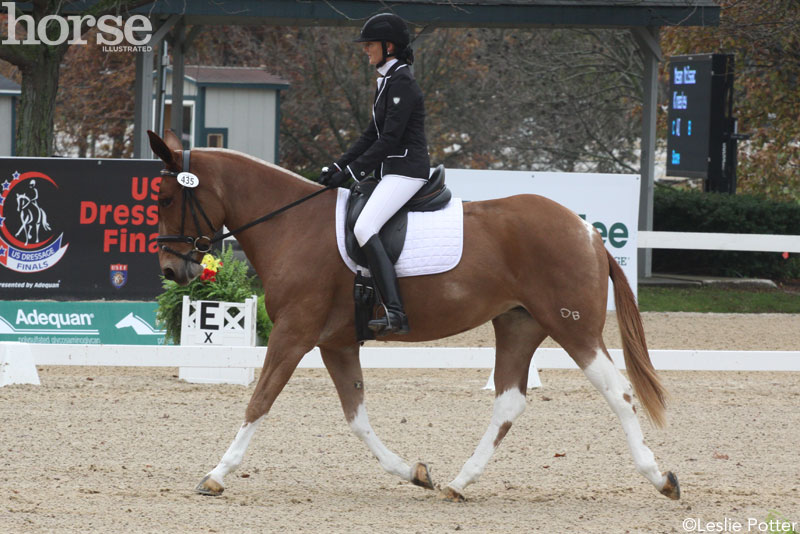
Most of the donations came from complete strangers, and I learned how greatly people have been touched by mules. I received encouraging emails from all over the world—Slovenia, Australia, the Netherlands, Colombia, and South Africa. The mule community came out in force. Donations came in honor of plow mules in Arkansas, pack mules in Canada, and gaited mules in South America. Dyna got gifts too, including a gorgeous new handmade browband and an equine massage. Every morning I wrote my thank-you notes, weeping with gratitude. But I knew I’d need more than money.
There is a magic that happens when you find the right trainer. My coach and mentor, Grand Prix rider and judge Renee Johnson, has helped me believe in myself and keeps me hungry to be a better rider.
I believe that dressage is a team sport. So many people have helped Dyna and me get to this point—mentors, vets, and friends who help groom at shows. That’s why when I received the invitation to the U.S. Dressage Finals, I called up Renee and my best friend, AMA president Casie Fairbanks, and said, “I can’t do this without you!” When they said they’d come, I knew it was going to be OK.
Competing at the finals was hands-down the most thrilling, educational experience of my life. I’d been anxious about the reception from other riders, but from the moment we arrived, I felt welcome. The riders in our barn aisle all supported each other and watched each other’s rides. We had a great sense of camaraderie.
Dyna constantly had admirers at her stall. Word of mouth and my fundraising campaign had set the stage: everyone knew there was going to be a mule at the finals. The positive energy was electric, and Dyna was rock solid through it all. By nature she is an introvert and a skeptic, and not really comfortable with strangers, but she just relaxed and let everyone pet her.
I couldn’t have been more proud of how Dyna went in her tests. The atmosphere was electric—the giant, flashing scoreboard, the abundant foliage, and the freezing rain were a lot to take in. Dyna was pretty frightened in her warm-up class, but she stayed right with me and listened. On the day of the finals test, she was more relaxed, and she went out and gave me her all. One of the judges gave her a 70 percent!
I have a deeper connection to Dyna than any other equine I’ve ever known, and it’s even stronger after our incredible journey. She continues to inspire me to be a better rider for her. Most of all, she has taught me the greatest life lessons: limits are imaginary and impossible dreams come true.
LAURA HERMANSON is a dressage rider and trainer based in Madera, Calif.
This article originally appeared in the March 2015 issue of Horse Illustrated magazine. Click here to subscribe!

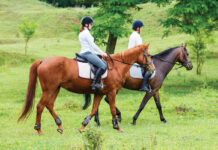
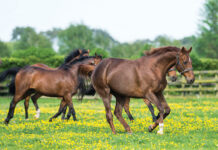
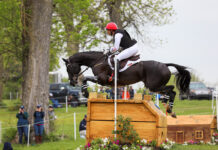

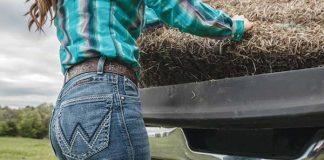
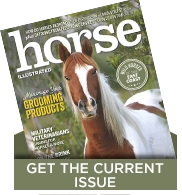
I wish everyone would live my this line…. “limits are imaginary and impossible dreams come true.” What a great inspiring story.
Great article! thanks for sharing with us. I have just rode my first mule a month or two ago, they deffinatly are something different!
I love it!